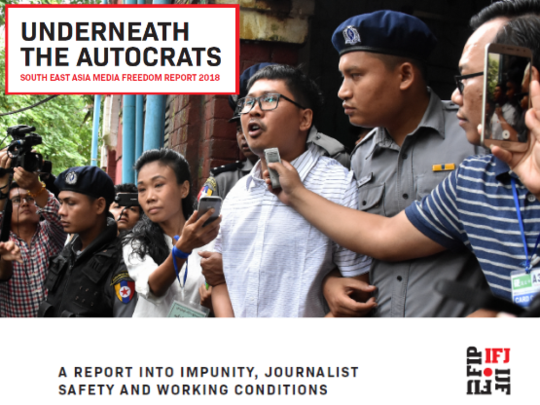On December 19, 2018, the International Federation of Journalists (IFJ) and the South East Asia Journalists Unions (SEAJU) has launched the first-ever IFJ Media Freedom Report for South East Asia supported by UNESCO.
The report Underneath the Autocrats: A Report into Impunity, Journalist Safety and Working Conditions, which was the first major collaboration between IFJ and SEAJU in South East Asia, has identified several findings hampering press freedom in the region.
Though every country in the report faced different challenges, there are some similarities that appeared in the region. Involving nearly 1,000 journalists and media workers in the region, the survey has found the consensus on poor wages and working conditions as the major threat to journalists in South East Asia.
Based on the findings, the report criticized that governments in the region failed to improve the welfare of journalists. Major changes in media industry, driven by the shifting into digital platform, have forced media companies to revise their income-generating methods and business models. As an impact, many newsrooms stopped their printed publications. In Thailand for instance, all major newspapers have gone through financial problems in recent years. Suffering business losses, the newsrooms then cut the number of workers. Similar challenges also occurred in different countries in the region.
Aside from all the above findings, the culture of impunity has been the major obstacles hampering the press freedom in the region. The perpetrators who killed and committed violence to journalists, including the murderer in the Ampatuan massacre where 32 of the 58 victims were media workers, remain free. The governments have ignored their commitment to protect journalists.
Abdul Manan, on behalf of SEAJU said: “We urge the governments in the region to show their commitment and attempts to protect journalists. One of the action is to reform or abolish the laws which target journalists. Also, the governments should take serious action to end the culture of impunity. The failure to prosecute perpetrators of crimes against journalists will perpetuate the cycle of violence.”
To address the poor journalists’ welfare, Abdul added: “It is not only the media companies which responsible to improve the working conditions, but also the governments. The authorities can play a big role to make sure the media houses provide better salaries and facilities, such as health insurance for the journalists.”
Abdul highlighted the need to support good quality journalism as a responsible free press so that it can play its role as an essential check and balance for the democracy and serve public interests.
The IFJ said: “The SEAJU report has shown that despite the differences between countries, the region is facing the common threats, such as working conditions and the culture of impunity. We need to reinforce the regional alliance and efforts to improve the safety of journalists and protect freedom of the press in South East Asia.”

